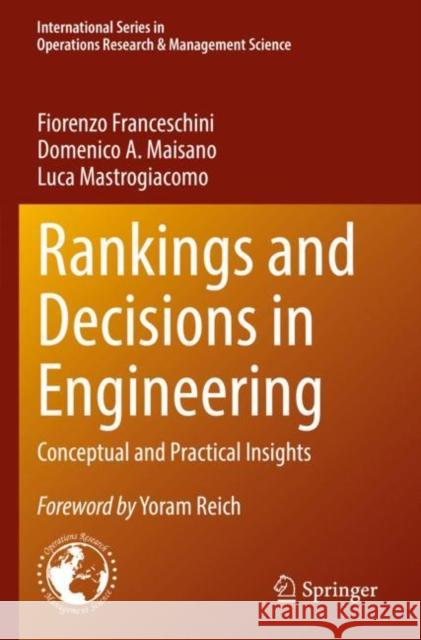Rankings and Decisions in Engineering: Conceptual and Practical Insights » książka
Rankings and Decisions in Engineering: Conceptual and Practical Insights
ISBN-13: 9783030898670 / Angielski / Miękka / 2023 / 248 str.
Rankings and Decisions in Engineering: Conceptual and Practical Insights
ISBN-13: 9783030898670 / Angielski / Miękka / 2023 / 248 str.
(netto: 537,98 VAT: 5%)
Najniższa cena z 30 dni: 539,74
ok. 16-18 dni roboczych.
Darmowa dostawa!
This book focuses on decision-making problems in engineering. It investigates the ranking aggregation problem and the related features, such as input/output data, simplification hypotheses, importance hierarchy of experts. In addition to a well-structured overview of several interesting, consolidated methodological approaches, it presents innovative approaches that can also be applied profitably in other fields. The fascinating selection of topics included is based on research that has been developed in the past twenty years. The descriptions are supported by figures, tables, flowcharts, diagrams, examples and practical case studies.The book is an ideal resource for engineering academics, practitioners, technicians and students, who do not necessarily have an in-depth knowledge of decision-making. It is also a thought-provoking read for engineers and academics looking for innovative ways to improve engineering processes in a variety of fields, such as conceptual design, quality improvement, reliability engineering.“Today, rankings are exercised in all spheres of life, products are ranked on Amazon and similar platforms; services such as restaurants and hotels on platforms such as TripAdvisor; and other services such as lectures or even medical treatment on different specialized platforms. We often make our daily decisions based on these rankings. The quality of our decisions depends on our ability to select appropriate methods to fit the context and needs. We need to be familiar with the theory and practice of these methods to make them useful. To this purpose, this book is an important addition to the bookshelves of academics and professionals, not only from engineering. The connection between theory and practice is weaved throughout the book, making it useful for practitioners also.”Prof. Yoram Reich, Full Professor and Head of Systems Engineering research Initiative at Tel Aviv University (Israel), Editor-in-Chief of “Research in Engineering Design”
This book focuses on decision-making problems in engineering. It investigates the ranking aggregation problem and the related features, such as input/output data, simplification hypotheses, importance hierarchy of experts. In addition to a well-structured overview of several interesting, consolidated methodological approaches, it presents innovative approaches that can also be applied profitably in other fields. The fascinating selection of topics included is based on research that has been developed in the past twenty years. The descriptions are supported by figures, tables, flowcharts, diagrams, examples and practical case studies.The book is an ideal resource for engineering academics, practitioners, technicians and students, who do not necessarily have an in-depth knowledge of decision-making. It is also a thought-provoking read for engineers and academics looking for innovative ways to improve engineering processes in a variety of fields, such as conceptual design, quality improvement, reliability engineering.“Today, rankings are exercised in all spheres of life, products are ranked on Amazon and similar platforms; services such as restaurants and hotels on platforms such as TripAdvisor; and other services such as lectures or even medical treatment on different specialized platforms. We often make our daily decisions based on these rankings. The quality of our decisions depends on our ability to select appropriate methods to fit the context and needs. We need to be familiar with the theory and practice of these methods to make them useful. To this purpose, this book is an important addition to the bookshelves of academics and professionals, not only from engineering. The connection between theory and practice is weaved throughout the book, making it useful for practitioners also.”Prof. Yoram Reich, Full Professor and Head of Systems Engineering research Initiative at Tel Aviv University (Israel), Editor-in-Chief of “Research in Engineering Design”











